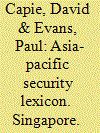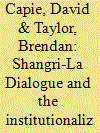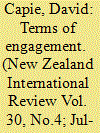|
|
|
Sort Order |
|
|
|
Items / Page
|
|
|
|
|
|
|
| Srl | Item |
| 1 |
ID:
080276


|
|
|
|
|
| Publication |
Singapore, Institute of Southeast Asian Studies, 2007.
|
| Description |
xv, 247p.
|
| Standard Number |
9789812304254
|
|
|
|
|
|
|
|
|
|
|
|
Copies: C:1/I:0,R:0,Q:0
Circulation
| Accession# | Call# | Current Location | Status | Policy | Location |
| 053053 | 355.03305/CAP 053053 | Main | On Shelf | General | |
|
|
|
|
| 2 |
ID:
143892


|
|
|
|
|
| Summary/Abstract |
Indonesia is frequently mentioned as an emerging player in United Nations (UN) peacekeeping, but its role has been understudied compared to other emerging powers. Drawing on interviews with foreign and defence ministry officials, and independent analysts in Jakarta, as well as statements by Indonesian representatives in the UN and other forums, this article makes three arguments. First, although Indonesia has a long history of involvement in UN peacekeeping operations (PKOs), there has been a major change in policy in the last decade, with much greater importance attached to peacekeeping. Jakarta has set itself the goal of becoming a top ten troop contributing country with 4,000 personnel deployed by 2019. Second, although Indonesia retains a strong preference for traditional “blue helmet” missions mandated by the UN Security Council (UNSC), and based on principles of host country consent, impartiality and non-use of force, its views on peacekeeping are evolving. While Indonesia has concerns about aspects of the “new” peacekeeping agenda, such as Protection of Civilians and robust peace enforcement missions, in practice it has proved to be more pragmatic than some of its rhetoric might suggest. Third, although emerging powers are frequently portrayed as conservative, Indonesia has been an advocate for a more ambitious approach to peacekeeping in Southeast Asia. It was the first to argue for an ASEAN peacekeeping force and has supported the use of regional troops to monitor peace agreements. In sum, the Indonesian case supports some of the claims made about emerging powers and peace operations but challenges others, underlining the diversity of this group of states.
|
|
|
|
|
|
|
|
|
|
|
|
|
|
|
|
| 3 |
ID:
085437


|
|
|
|
|
| Publication |
2008.
|
| Summary/Abstract |
Over the last decade, a range of actors have pressed for states and regional organizations to take action against the illicit trade in small arms and light weapons. Some regional bodies have responded with comprehensive plans of action and impressive policy responses; others have done very little. This article examines the `patchy' response of the Association of Southeast Asian Nations (ASEAN). It looks at how ASEAN played a mediating role between global norm entrepreneurs seeking to promote small arms norms in the region and member-states that opposed many of their goals.
|
|
|
|
|
|
|
|
|
|
|
|
|
|
|
|
| 4 |
ID:
139713


|
|
|
|
|
| Summary/Abstract |
David Capie provides an overview of New Zealand’s relationship with South-east Asia over four decades and notes challenges ahead.
|
|
|
|
|
|
|
|
|
|
|
|
|
|
|
|
| 5 |
ID:
110190


|
|
|
|
|
| Publication |
2012.
|
| Summary/Abstract |
There is growing interest among scholars and advocates in the way that the nascent norm of the Responsibility to Protect (R2P) is diffusing at the regional level. This article critically explores the spread of R2P in Southeast Asia against the backdrop of recent scholarship on norm localization. It argues that, contrary to some recent analyses, the R2P norm has not been localized in Southeast Asia. Constitutive localization requires the active borrowing of transnational norms by local or regional actors who build congruence with local practices. Although some regional states have used the language of 'sovereignty as responsibility' there are few signs that local actors are driving the reception of the norm in the region, nor have they institutionalized it. Rather, outsider proponents are the primary advocates and the norm lacks a champion or well-connected 'insider' proponent among regional governments or civil society groups. Second, despite an energetic campaign by advocates, emphasizing consensual and capacity-building activities, many governments are still wary of R2P as a potential threat to sovereignty and regime security. As a result, regional states have taken an 'à la carte' approach to R2P, accepting aspects of the R2P agenda that they find least threatening or that support their national interests, while ignoring or quietly resisting those they find challenging. Rather than localization, what we are seeing with respect to R2P in Southeast Asia is a dramatic change in the way outsiders are reframing the norm.
|
|
|
|
|
|
|
|
|
|
|
|
|
|
|
|
| 6 |
ID:
097128


|
|
|
|
|
| Publication |
2010.
|
| Summary/Abstract |
The gradual institutionalization of defence diplomacy is becoming an increasingly prominent and potentially important feature of security dialogue in the Asian region. This stands in marked contrast to Asia's recent history, where across the region multilateral defence or military interactions have traditionally been regarded with suspicion. This article examines the emergence of Asia's most prominent exercise in defence diplomacy: the Shangri-La Dialogue (SLD). Within a relatively short space of time, this forum has developed into one of the most important opportunities for regional defence ministers and senior military officers to meet and exchange views on security issues. Yet despite its growing standing, the SLD has received virtually no scholarly attention. The article begins by reviewing the origins and development of the SLD, before outlining its operating modalities. It seeks to account for the apparent appeal of the SLD, measured in terms of its capacity to consistently attract high-level representation and favourable reviews. The article explores how the SLD might develop in the future and outlines some of the challenges it faces, including the rise of potentially competing mechanisms for defence diplomacy in East Asia. The article closes by outlining a number of areas for further research.
|
|
|
|
|
|
|
|
|
|
|
|
|
|
|
|
| 7 |
ID:
103960


|
|
|
|
|
| Publication |
2011.
|
| Summary/Abstract |
Among Pacific states, Papua New Guinea (PNG) has attracted the most attention from researchers looking at problems caused by small arms and light weapons. There is now a substantive body of work cataloguing different aspects of the country's problems with firearms and gun violence. This research sits alongside a large scholarly literature on violence in PNG and the connection between violence, gender and masculine identities. There has, however, been strikingly little research bringing these literatures together and looking directly at the gendered dimensions of PNG's gun violence. This paper explores some connections between small arms, violence and gender in PNG. After providing a general overview of small arms issues in PNG, it examines the misuse of firearms in urban crime and inter-communal fighting in the Highlands, specifically noting the limited evidence that is available about the differently gendered consequences of gun violence. It identifies three potential areas for further research: exploring the relationship between changing notions of masculinity and demand for firearms; gender and PNG's growing private security industry; and fragile signs of change in the role of women in the PNG Defence Force.
|
|
|
|
|
|
|
|
|
|
|
|
|
|
|
|
| 8 |
ID:
119222


|
|
|
|
|
| Publication |
2013.
|
| Summary/Abstract |
This article examines why Asia's multilateral defence diplomacy has been a relative laggard when compared to other forms of institutionalized security dialogue, and what explains its recent rise. It argues that explanations that stress the "catalytic role" of external shocks such as the Asian Financial Crisis (AFC) or changes in the distribution of power or threats are underdetermining. Rather, Asia's new multilateral defence diplomacy reflects strategic emulation on the part of ASEAN elites, who localized ideas initially put forward by outsiders in order to maintain ASEAN's central place in the regional security architecture. Its rise has also been helped by the changing role of militaries in some East Asian states and its rapid institutionalization owes much to historical contingency, in particular the interests of two influential ASEAN Chairs in Indonesia and Vietnam. The final part of the article briefly assesses the future prospects and influence of regional multilateral defence diplomacy.
|
|
|
|
|
|
|
|
|
|
|
|
|
|
|
|
| 9 |
ID:
062616


|
|
|
|
|
| Publication |
Jul-Aug 2005.
|
|
|
|
|
|
|
|
|
|
|
|
|
|
|
|
|
|
|
|
|